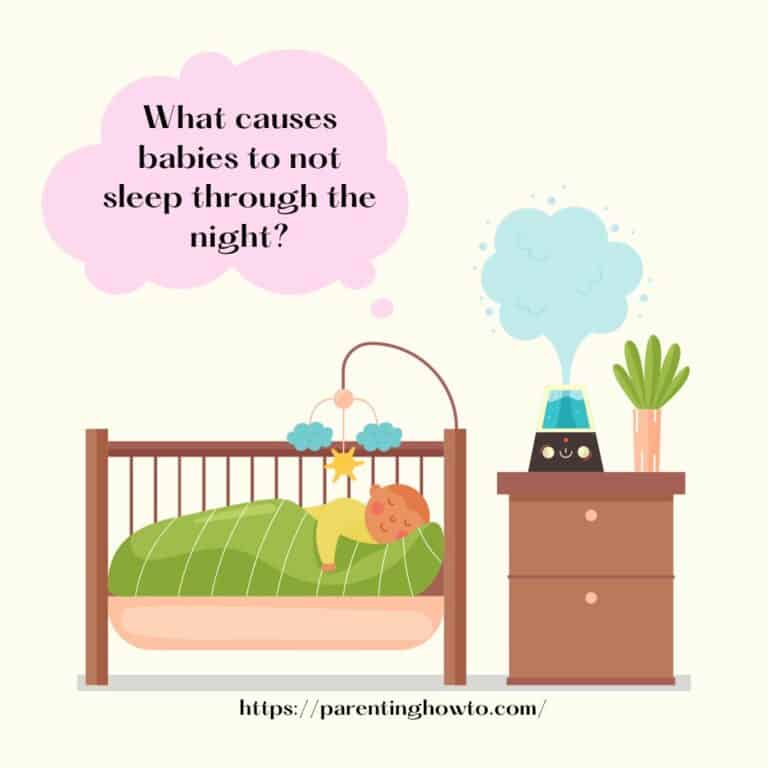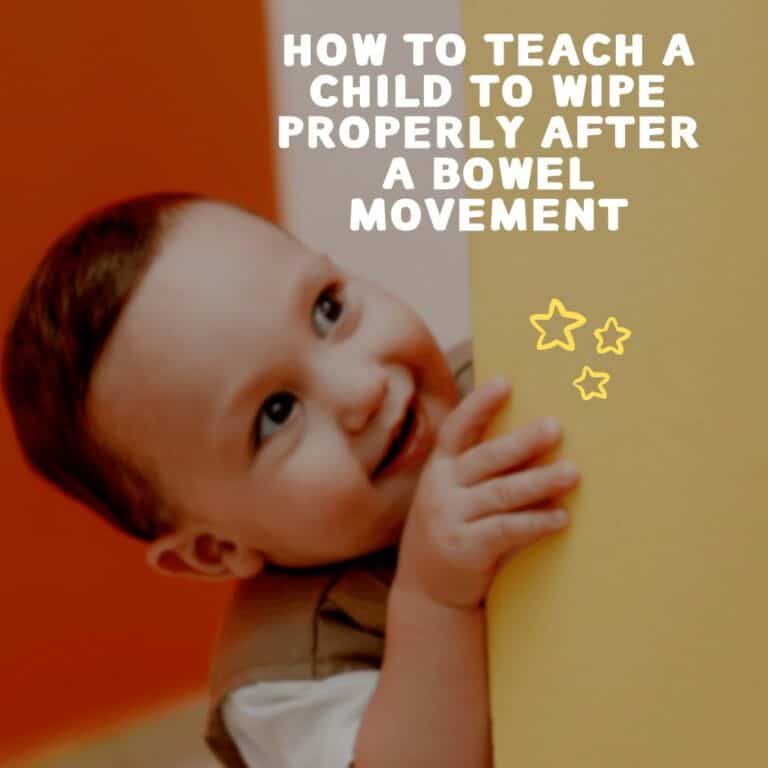It can be a pretty overwhelming experience when your toddler poops while they’re sleeping. But don’t worry, there are some simple steps you can take to make sure that it’s handled safely and hygienically. In this blog post, we’ll walk you through what to do if your toddler poops while sleeping.
Don’t Panic

Don’t panic when it comes to dealing with your toddler’s pooping habits. It can be a normal part of the potty-training process and even a sign of good health if they are going regularly.
Also Read: How Should Newborn Stool Look Like
To help keep things on track, try giving your toddler some alone time before their nap or bedtime to encourage them to go on the potty. If constipation is an issue, try eating more fiber-rich foods and drinking plenty of water for natural relief.
You can also gently massage their belly or legs before or while they’re doing it to reduce stress and make it easier for them to go. Lastly, try establishing regular bathroom times throughout the day so that your child learns when it’s appropriate to use the toilet.
Change the Bed Linens and Pajamas

Changing bed linens and pajamas after your toddler has pooped in their sleep is essential. Not only will it ensure their comfort and cleanliness, but it can also help to prevent diaper rash and other skin irritations.
First, make sure you have fresh linens ready to go on the bed before taking off the soiled ones. This will help minimize mess and make the changeover smoother. Then, remove the soiled sheets and pajamas from the bed and put them in a sealed bag for later washing.
Next, put on new sheets and pajamas for your toddler that are clean and comfortable. Make sure to tuck in all sides of the sheets tightly so they don’t come undone while your toddler is sleeping or playing in bed. You may want to consider using fitted sheets with elastic around all four corners for an extra snug fit if you’re concerned about them coming undone during movement or playtime.
Finally, give your toddler a hug or a snuggle to let them know everything is alright. This can help ease any anxiety they may have about their accident and reassure them that everything is taken care of now.
Changing bed linens and pajamas after your toddler has pooped in their sleep is not only important for hygiene reasons but also helps maintain your child’s comfort levels throughout the night so they can get good restful sleep!
Deal with the Mess as Quickly as Possible
When your toddler poops while sleeping, it’s important to deal with the mess quickly to avoid any potential health risks. Start by removing the soiled sheets and clothing and cleaning the area thoroughly. Dispose of any used materials appropriately, such as in a sealed bag.
If your toddler is wearing diapers or pull-ups at night, consider switching them out for underwear instead. This will make it easier for your child to sense when they need to go and will reduce the chance of them having an accident while they sleep.
To help prevent accidents in the future, establish a consistent bedtime routine that includes bathroom visits before they go to sleep. You should also feed your toddler earlier than usual so that their bodies have time to digest everything before bedtime. Finally, provide incentives for using the toilet correctly during the day – rewards like stars on a chart or fun stickers can be great motivators!
Clean Up All Surfaces Thoroughly

Cleaning up after your toddler’s poop is an important part of potty training and keeping germs at bay. It’s important to clean all surfaces thoroughly to prevent the spread of bacteria and other germs.
First, you should remove any soiled clothing or bedding. If the accident happened in a bathtub or hot tub, drain out the water and start scrubbing it down with white vinegar diluted in water or a cleaner that contains bleach. Use a sponge or cloth to wipe down all accessible surfaces that were in contact with contaminated water. Replace or clean filter media when appropriate as well.
It’s also recommended to feed your baby earlier in the day so they have time to digest before sleeping, and take them to the toilet when they show signs they need to go. For babies with delicate skin, you can use wet washcloths, cotton balls, or baby wipes for cleanup after bowel movements instead of toilet paper. Make sure you use a 0.1% bleach solution for wiping down any areas touched by hands as these are most likely contaminated by vomit or feces.
If your child has symptoms of encopresis such as soiling and constipation it’s best to call their doctor right away for advice on how best to manage the situation. Lastly, don’t forget that it’s important not only for hygiene but also potty training success that you take your toddler to the toilet before bedtime each night where they should sit for 10 minutes even if nothing happens during this time!
Give Your Toddler a Bath

A warm bath before bedtime is a great way to relax and help your toddler poop. Make sure to remove toys from the tub and get rid of any excess water when finished.
You can also give your toddler a baby massage or do bicycle legs to get their system moving. Give high fiber cereals and P fruits – pears, plums, peaches, prunes – earlier in the day so they have time to digest it before sleeping.
Make bathroom breaks a laid-back activity with lots of positive reinforcement. Invite them to use the potty frequently “just to see” and talk about what they’re worried about if they’re anxious about using the toilet.
Let them poop in their diaper but lead them to the bathroom when they have a bowel movement. After a week or so, continue letting them poop in their diaper but only in the bathroom. Schedule regular bathroom breaks by asking if they feel the urge to pee and giving verbal reminders throughout the day or before bedtime.
Use Detergent or Disinfectant on Carpeted Areas
Cleaning up after your toddler’s accidents is never fun, but it doesn’t have to be too difficult. If your toddler has pooped while sleeping, using detergent or disinfectant on carpeted areas can help to clean up the mess.
First, use paper towels or kitty litter to soak up any liquid. Then, mix a solution of liquid dish soap, a splash of white vinegar and warm water and sponge it onto the stain. Allow the solution to sit for at least 10 minutes before rinsing with cool water and blotting dry with a towel. For hard surfaces such as counters or toys that your child puts in his mouth, look for “phenolic solution” on the label of a disinfectant or use soapy water for cleaning.
For cloth diapers or other fabrics that have been stained by poop, soak them in warm water before washing them with detergent or carpet cleaning agent. Once all surfaces have been cleaned and dried properly, throw away any contaminated items in a plastic bag and discard them properly. Finally, scrub the toilet seat daily with disinfectant or soap and water to keep it hygienic!
Wash Clothing Separately from Other Laundry

Washing clothing separately from other laundry is an important part of keeping your clothes and linens clean and hygienic. Separating baby clothes, in particular, is important to protect against any potential germs or bacteria that may be present.
When washing items separately, it’s important to use a mild detergent that won’t irritate sensitive skin. Additionally, it’s best to wash soiled clothing and linens by hand with cold water before throwing them in the washing machine on warm.
Lastly, when handling soiled items always wear disposable gloves to protect yourself from any potential germs or bacteria. Following these simple steps will help ensure you keep your clothing and linens clean and safe for everyone in your household!
Use Baby Powder for Extra Freshness

Baby powder can be a great way to keep your baby feeling fresh and clean. It can help to absorb moisture and odors, reduce friction, and even help with diaper rash. It’s important to use baby powder safely, however. Inhaling the powder can cause health problems for both you and your baby.
When using baby powder, only sprinkle a small amount on the skin or in the diaper area. Avoid putting it directly on open wounds or near your child’s eyes and mouth as this may cause irritation. Make sure that all excess powder is brushed away before dressing your child so they don’t inhale any of it when breathing.
To help prevent diaper rash, try using cornstarch-based baby powders instead of talcum-based ones as talc has been linked to respiratory issues when inhaled. Many organic or natural powders are made without talc and are safe for babies if used correctly.
If you’re worried about a potential diaper rash issue, talk to your doctor about other gentle home remedies like bathing the area with warm water or applying an ointment like petroleum jelly over the affected area instead of using baby powder.
Remember that although baby powder is helpful in keeping your little one dry and smelling fresh, it’s important to use it correctly so that neither you nor your child experience any negative side effects!
Freshen Up Pillows and Mattress Covers

Having a clean mattress and pillows is essential for a good night’s sleep. Fortunately, freshening up your bedding is easy and straightforward. With the right supplies and cleaning methods, you can keep your mattress, pillows, and bedding fresh and free of odors.
Start by removing any sheets and covers from the mattress or pillow. Vacuum both sides of the mattress to remove dirt, dust mites, or other debris. Then spot-clean any stains with an appropriate cleaner that is safe for use on mattresses or pillows.
Next, spray the mattress with an enzyme cleaner to help break down urine or other bodily fluids that may have soaked into the mattress. If you don’t have an enzyme cleaner available, you can substitute white vinegar diluted in water as a natural alternative. To finish up your deep cleaning routine, sprinkle baking soda onto the surface of the mattress to absorb odors and leave it for about 15 minutes before vacuuming it off again.
Finally, throw any pillow cases or sheets into the washing machine using warm water and detergent as usual. A fragrance-free detergent will prevent any additional odors from being added during washing machines cycle! With these simple steps you will have your bedding fresh in no time at all!
Vacuum Around the Bed Area to Remove Any Remaining Odor
If you have ever experienced a foul odor lingering in your bedroom, it might be time to vacuum around the bed area. Vacuuming can quickly and easily remove any odors that have been trapped in the carpet, upholstery, and mattress. Here is a quick guide on how to vacuum around the bed area to get rid of odors:
1. Begin by vacuuming all of the flooring and carpets surrounding your bed. This will help remove dust and other particles from the area which can cause unpleasant smells.
2. Next, vacuum any furniture or upholstered surfaces near your bed including chairs and couches if applicable.
3. Finally, use an attachment such as a crevice tool or dusting brush to reach between folds of fabric on the headboard, footboard, and mattress itself if possible. This will help remove dust mites and debris that can cause odors over time.
Vacuuming regularly is an effective way to keep odors at bay in your bedroom as well as other areas of your home. If you experience persistent odors after vacuuming around the bed area, contact an experienced professional for advice on further cleaning methods or alternative solutions such as air fresheners or deodorizers.
Conclusion
When it comes to dealing with toddlers who poop while sleeping, it is important to take a few steps to help them. First, make sure to never put your toddler to sleep immediately after feeding time as this can lead them to have an accident.
Additionally, try giving them a few minutes of safe alone time before naps and bedtime so that they can have a chance to use the bathroom on their own.
If they do have an accident while asleep, clean them up right away and talk about their fears and show empathy as you address the issue.
Lastly, be sure not to feed your baby right before bedtime and if necessary provide foods in the morning that can help speed up bowel movements. These steps should help reduce the chances of your toddler pooping while asleep.



